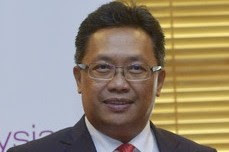All students may spend their finals days
in university learning to steer clear of corruption before entering the
workforce.
Under a programme planned for all higher education
institutions, students will be introduced to real-world scenarios they could
face during their careers.
 The awareness programme is among measures being mooted
by the Malaysian Anti-Corruption Commission (MACC) in collaboration with both
the Education and Higher Education ministries.
The awareness programme is among measures being mooted
by the Malaysian Anti-Corruption Commission (MACC) in collaboration with both
the Education and Higher Education ministries.
MACC director of strategic communications Abdul Samat
Kasah said the introduction of anti-corruption modules for certain courses,
like finance or engineering, where students are more likely to face such
challenges, was also in the pipeline.
“These modules will be benchmarked against what is being
done in other countries,” he told The Star.
He pointed out that certain universities including
Sheffield in Britain had a compulsory professionalism in engineering subject
for final year students.
The subject incorporated code of ethics, good governance
and the law on bribery.
Abdul Samat said the subject included course work,
examinations and one hour of class for a whole semester.
The University of Sheffield engineering graduate school
also has a Professional Behaviour and Ethical Conduct module.
Abdul Samat said the move was part of measures to curb
corruption in society.
He said MACC was working with Universiti Perguruan Sultan
Idris to come up with an anti-corruption teaching manual to help teachers
drive home the message.
“The manual is almost ready and will be sent to the
Education Ministry for approval,” he said.
A more subtle approach is being taken to instil a firm
anti-corruption foundation among students at the primary level.
Abdul Samat said MACC, together with the Education
Ministry’s textbook division, were improving textbooks to drive home the
message wherever possible.
“This included the new textbooks for moral, language and
religious studies,” he said.
The move has been welcomed by integrity advocates.
Minister in the Prime Minister’s Department Datuk Paul Low said teaching
students in the classroom could only go so far.
“It’s the parents who have to set an example. Teaching a
generation to be intolerant of bribes has to start from the home,” he said.
Low claimed that modern parenting methods were
“monetising” children and making them associate success with material gains.
Transparency International Malaysia president Datuk
Akhbar Satar called on the MACC to do the same in kindergartens.
He said while it remained to be seen how effective the
anti-corruption modules would be in school, it would be easier to drum the
message of integrity into younger children.
“They must be moulded. It’s a good move, but we will have
to see what they do,” he said, citing Japan and Sweden as countries where
kindergarten children were taught integrity.



